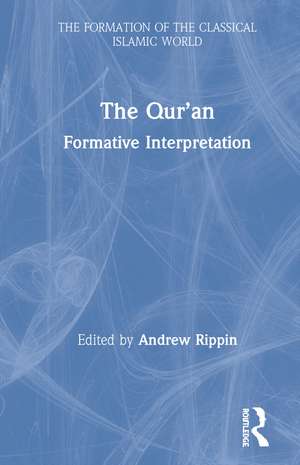The Qur’an: Formative Interpretation: The Formation of the Classical Islamic World
Editat de Andrew Rippinen Limba Engleză Hardback – 28 dec 1999
Din seria The Formation of the Classical Islamic World
- 24%
 Preț: 330.57 lei
Preț: 330.57 lei - 29%
 Preț: 1246.12 lei
Preț: 1246.12 lei - 9%
 Preț: 1659.97 lei
Preț: 1659.97 lei - 28%
 Preț: 1585.56 lei
Preț: 1585.56 lei - 27%
 Preț: 1216.18 lei
Preț: 1216.18 lei - 25%
 Preț: 1249.21 lei
Preț: 1249.21 lei - 29%
 Preț: 1022.09 lei
Preț: 1022.09 lei - 28%
 Preț: 1473.15 lei
Preț: 1473.15 lei - 29%
 Preț: 1300.76 lei
Preț: 1300.76 lei - 27%
 Preț: 1059.63 lei
Preț: 1059.63 lei - 28%
 Preț: 1418.71 lei
Preț: 1418.71 lei - 29%
 Preț: 1249.37 lei
Preț: 1249.37 lei - 27%
 Preț: 1051.46 lei
Preț: 1051.46 lei - 29%
 Preț: 1162.81 lei
Preț: 1162.81 lei - 25%
 Preț: 688.22 lei
Preț: 688.22 lei - 29%
 Preț: 1161.17 lei
Preț: 1161.17 lei - 28%
 Preț: 1417.98 lei
Preț: 1417.98 lei - 21%
 Preț: 338.37 lei
Preț: 338.37 lei - 29%
 Preț: 1410.83 lei
Preț: 1410.83 lei - 28%
 Preț: 1383.76 lei
Preț: 1383.76 lei - 27%
 Preț: 1499.60 lei
Preț: 1499.60 lei
Preț: 1014.74 lei
Preț vechi: 1366.55 lei
-26% Nou
Puncte Express: 1522
Preț estimativ în valută:
194.20€ • 201.99$ • 160.32£
194.20€ • 201.99$ • 160.32£
Comandă specială
Livrare economică 25 martie-08 aprilie
Doresc să fiu notificat când acest titlu va fi disponibil:
Se trimite...
Preluare comenzi: 021 569.72.76
Specificații
ISBN-13: 9780860787013
ISBN-10: 086078701X
Pagini: 412
Dimensiuni: 174 x 246 mm
Greutate: 0.45 kg
Ediția:1
Editura: Taylor & Francis
Colecția Routledge
Seria The Formation of the Classical Islamic World
Locul publicării:Oxford, United Kingdom
ISBN-10: 086078701X
Pagini: 412
Dimensiuni: 174 x 246 mm
Greutate: 0.45 kg
Ediția:1
Editura: Taylor & Francis
Colecția Routledge
Seria The Formation of the Classical Islamic World
Locul publicării:Oxford, United Kingdom
Cuprins
Contents: Introduction; The beginnings of the Qur’anic exegesis, Claude Gilliot; The early development of Tafsir, Nabia Abbott; Old Muslim opposition against interpretation of the Qur’an, Harris Birkeland; From Midrash to scripture: the sacrifice of Abraham in early Islamic tradition, Norman Calder; Ibn ’Abbas’s Al-lughar fi’l-Qur’an, Andrew Rippin; Ibn ’Abbas’s Gharib al-Qur’an, Andrew Rippin; Poetry citation as interpretive illustration in Qur’an exegesis: Masa’il Nafi’ ibn al-Azraq, Issa J. Boullata; The dogmatic religious stance of the grammarian Yahya ibn Ziyad al-Farra, Edmund Beck; The treatment of qira’at by the second and third century grammarians, Ramzi Baalbaki; Maturidi and his Kitab Ta’wilat al-Qur’an, Manfred Götz; Religious influences on medieval Arabic philology, Lothar Kopf; Majaz al-qur’an: periphrastic exegesis, John Wansbrough; The early meaning of majaz and the nature of Abu ’Ubayda’s exegesis, Ella Almagor; Muhkamat and mutashabihat (Koran 3/7): implications of a Koranic pair of terms in medieval exegesis, Leah Kinberg; Some remarks on the Qisas al-Anbiya’ works in Arabic literature, Ján Pauliny; The term ’Khalifa’ in early exegetical literature, Wadad al-Qadi; Those are the high-flying cranes, John Burton; Index.
Recenzii
'...an ideal introduction for degree level study of the Qur’an in the first three hundred years of Islam.' Centre for Islamic Studies Newsletter, 'This book should be read by all students of Qur'anic exegesis for all the valuable information it contains, the sources it open up, and the selected scholarship it offers on problems of continuing interest in the field...' Digest of Middle East Studies 'The volume's main strength rests upon it furnishing a broad overview of academic perspectives and approaches to the formative tradition of exegesis, particularly those which are current and predominant. Comprising many fascinating and thought-provoking contributions, the volume draws attention to the theoretical debates which have prefigured approaches to exegesis, focusing upon the issues of the emergence of canon, together with perceptions of authenticity, historicity and ascription.' Journal of Qur'anic Studies
Descriere
The Qur’an: Formative Interpretation is concerned with the questions that have been addressed within the study of the early interpretation (tafsir) of the Qur’an. These papers exemplify the areas of debate within the field, the need for detailed investigative scholarship of individual texts, and the progress made in the systematic study of these early works. This volume is one of two edited by Andrew Rippin which are designed to complement one another, and to comprehend the principal trends in modern scholarship on the Qur’an. Both volumes are provided with a new introduction by the editor, analysing this scholarship, and providing references for further study.
